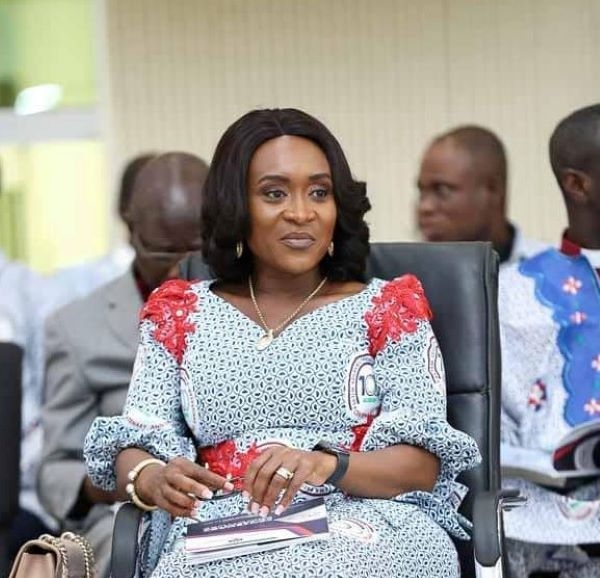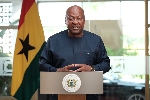Gold-for-Oil programme strengthened cedi – Gov't
 Minister of State-Designate for the Finance Ministry Abena Osei-Asare
Minister of State-Designate for the Finance Ministry Abena Osei-Asare
Minister of State-Designate for the Finance Ministry Abena Osei-Asare has told parliament that the government's gold-for-oil programme "improved the strength of the cedi".
Debating President Nana Akufo-Addo's State of the Nation Address on the floor of Parliament on Thursday, 29 February 2024, Ms Osei-Asarw said "we all saw how the cedi depreciated against major currencies in November 2022".
"It went as high as 54 per cent to the dollar and Mr Speaker, due to this programme, we have seen the cedi gain some strength and as we speak, from February 2023 to December 2023, the cedi depreciated by just 9 per cent".
She said: “Coupled with the improvement in the strength of the cedi and inflation with our debt and fiscal sustainability programme, we saw our growth numbers going up.”
The implementation of the government’s Gold-for-Oil (G4O) programme commenced last year with the arrival of the first consignment of about 40,000 metric tonnes of diesel on January 15, 2023, valued at about US$40 million.
The prime objective of the programme was to use additional foreign exchange resources from the Bank of Ghana’s Domestic Gold Purchase (DGP) programme to provide foreign currency for the importation of petroleum products for the country which, at the time, stood at about US$350 million per month.
Payment for oil supply was to be done in two channels: by way of barter trade where gold is exchanged for oil or via broker channel where the gold was converted into cash and paid to the supplier.
The first consignment of 40,000 metric tonnes of diesel constituted about 10 per cent of the country’s combined monthly demand for petrol and diesel.
The plan was to gradually increase imports under the G4O to constitute about 50 per cent of the country’s total demand for petrol and diesel by March 2023.
The implementation of the G4O was intended to ease pressure on the dollar (the currency used for the importation of petroleum products) and avoid the occasional increases in petroleum prices resulting from the depreciation of the cedi against the dollar.
The programme was also to ensure that the cost of importing the products from international oil traders was comparatively cheaper.
The consequent reduction in foreign exchange pressures and premiums charged by international oil traders as well as efficiency gains from the value chain were expected lead to lower ex-pump prices in the country.
To ensure that the price of petroleum products imported under the G4O programme reflected at the pumps to benefit the consumer, the National Petroleum Authority (NPA) regulated the prices of the products in the interim until the volumes increased significantly.
The NPA also worked with the Bulk Oil Storage and Transportation Company Limited (BOST) to negotiate prices with international oil traders to ensure that the landed cost of products procured under the programme were always competitive.
The price at which BOST was to sell the products to Bulk Import, Distribution, and Export Companies (BIDECs) was to be approved by the NPA.
The price at which the BIDECs sold the products to Oil Marketing Companies (OMCs) was also approved by the NPA.
The applicable exchange rate for pricing the products supplied under the G4O was to be based on the average rate at which the gold was purchased from the licensed gold exporters by BoG.
The BoG ordinarily purchases the gold aggregated by the Precious Minerals Marketing Company (PMMC).
The NPA also put measures in place to ensure that OMCs that liftes products supplied under the G4O programme passes the price on to consumers accordingly. In this respect, BIDECs and OMCs who lifted and supplied G4O products sold them at the ex-refinery and ex-pump prices that were determined by the NPA.
If there had to be a comingling of products supplied under G4O and other sources, the ex-refinery and ex-pump prices were computed using a weighted average.
Additionally, all BIDECs and OMCs who wished to purchase products under the G4O programme were required to sign off an undertaking confirming their willingness to comply with the terms and conditions for partaking in the purchase and sale of G4O products.
Source: classfmonline.com
Trending News

Ghana is “rising again,” President Mahama declares in 2026 New Year message
21:45
V/R: 15 arrested after sporadic shooting at Ho central mosque, 7 hospitalised
12:19
A/R: Police arrest suspect for conspiring to commit robbery at Manso Abrense
21:27
GoldBod dismisses claim of losses as “imaginary”
12:00
2024 Adabraka ₵7.5m daylight jewellery shop robbery: Police arrest suspect
19:29
141 arrested in major cybercrime crackdown targeting MoMo fraud, online scams
10:36
Tema police foil robbery attack at Afienya-Mataheko
00:04
Awutu Senya East MP, MCE engage security agencies to review security situation
10:07
“You Are a Destiny Changer” — Beneficiary’s story moves audience at Dr Adutwum thanksgiving event
23:16
Ghana Medical Trust Fund engages Ghana Health Service, HeFRA on strengthening health system reforms
09:50




